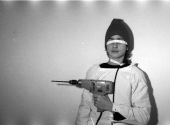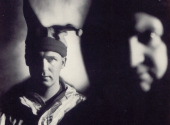
Milestones in Music History #8: Kid A and the Birth of Contemporary Music
Noise Music; Barret; Suicide; Velvet Underground; Desert Rock; the history of music is a perilous and yet appeasing path to walk. It has been, since the very beginning of times, this powerful gift, and music is possibly the most evolving and sophisticated form of art, which affected culture, lifestyle, society, and history itself. The purpose of the Insounder series “Milestones in Music History” is to delight you with some of the pivotal moments in music, some acts, facts, and records that delineated and shaped music for years to come (actually as far as this series could go on). I have selected a few, based on my personal path through music culture, and based on the fact that I firmly believe these moments radically changed everything. The end of the ’90s represents the end of an era, not only from a historical and social point of view but also from a cultural and artistic one. Fear caused by the uncertainty of what would happen next, and awareness at the same time that everything will change forever in the new millenium. Nothing could be more representative and explicatory of this transition in the ’00s than the birth of Radiohead’s "enfant prodige": Kid A.
Everybody feared the advent of the 2000s, well almost everybody. No one knew what would be next in music, as the previous decade, the ’90s, had barked and bitten and left an indelible mark on people’s minds and habits. Certainly, nobody would expect a band who had previously released songs drowned in rock and grunge—with a certain brit-pop twist—to go out just a couple of years later with a revolution in their hands.
Radiohead was born in 1985 in Oxfordshire, just a few years after their birth they signed to EMI in 1991, and found immediate success just one year later following the release of their debut single "Creep" in 1992. With their first album, Pablo Honey, and their second, The Bends, the band already started capturing a fan base and quickly spread their fame. However, it is with the 1997 release of the ultra-known and acclaimed OK Computer that Radiohead confirmed its status internationally. Their songs of the time reflect tensions and contradictions of society, describing how the individual gets lost in the mass and becomes the mass itself. From the pop-grunge of Pablo Honey, the band arrived at nostalgia mixed with corporate nervousness which constitutes the background of OK Computer, an album influenced by soundtrack music and krautrock.
But Kid A is different.
Just three years after the release of OK Computer, the band started working on several new tracks in a completely different direction. Thom Yorke started to incorporate synthesizers, drum machines, and an instrument belonging to a period of earlier electronic music, the Ondes Martenot (used also by other artists such as Daft Punk and Damon Albarn). They still kept their influences of jazz and krautrock alive, but in a new sensational and intriguing way.
Another innovation is represented by the fact that the band, which was producing songs for another album simultaneously (Amnesiac was released only eight months after Kid A), released the album via online streaming quite some time before the actual release of the record in the stores. An absolute subversive maneuver, which maybe appeared hazardous at the time, but is quite understandable today. Fighting the system from within.
The opening track "Everything in Its Right Place" has a self-explanatory title in an obviously ironic way. Yorke seems to be singing far away, transparent as a ghost, as if in the coldest desert on Earth, chanting: "Everything, everything, everything, everything… in its right place." That word "place" echoes like a thousand voices passing through you. The refrain is also eloquent—"Yesterday, I woke up sucking on a lemon," and later, "There are two colors in my head/ What, what is that you tried to say?"—because it describes in a sublime way, in my opinion, the sense of perdition of the ’00s individual, who does not know what to expect, but is definitely ill-prepared for it.
If the opening track did not serve the purpose of giving the sense of lostness enough, "Kid A" does the job well. It is exactly how I would imagine the first moments after the birth of a baby—not an ordinary one, and in a world that's not the same as the one we knew.
The third track is—in my opinion, of course—the most beautiful ever made by Radiohead, and obviously the most amazing track of the whole album. "The National Anthem" could be the anthem of a nation if it was an Orwellian world with an abstract pixeled landscape, and we were all together as one, as Lennon famously sang. That's also more or less what Yorke probably intends to communicate to us, but with much less hope than Lennon—"Everyone is so near/ Everyone has got the fear/ It's holding on." Accompanied by what sounds like elephant trumpets and maddened saxophones, it’s the chaos of now and today, and we are living in it—we are it. The cherry on top is the use of Ondes Martenot and samples from radio stations. The "chaos" was led and directed by the jazz musician Charles Mingus, who instructed the orchestra to play as they were in a traffic jam.
"How to Disappear Completely" is inspired by Doug Richmond's 1985 how-to book How to Disappear Completely and Never Be Found, a guide on creating a new identity. The orchestration was influenced by Polish composer Krzysztof Penderecki. The song dissolves dreamily, a nostalgic ballad with distant guitars in the background, with the hope of dealing well with the approaching new world. It sounds like a beautiful farewell, the kind without regrets.
The oneiric and instrumental "Treefingers" constitute a transition to three very well-constructed tracks, arguably the three most "classic" Radiohead songs; "Optimistic," "In Limbo," and "Idioteque". Of all three, "Idioteque" is probably the one that most combines the old and the new, which tells us the entire story of the band in only 5 minutes and 9 seconds. Yorke's syncopated and labored rhythm, the strings, and the disjointed beat in the middle all connect to the inability to maintain stability. We even lose the meaning of the word "stability." The strongest feeling is the lack of orientation, and it’s beautiful to get lost in it.
The album closes with two outros, because both songs drop the curtain on Kid A's alienating and hallucinating journey. "Morning Bell" is a broken, repeating morning alarm that we don't want to turn off; it's an alarm clock that lulls us and keeps us in bed. Gently.
And so it comes: "Motion Picture Soundtrack," a beautiful realization of the fact that we cannot resist fate, and everything changes inexorably. Disillusionment comes, for everything we thought was true—"Stop sending letters/ Letters always get burned/ It's not like the movies/ They fed us on little white lies"—and with a final hope—"I will see you in the next life."
What made Kid A one of the greatest albums in music history is that it is visionary and ahead of his time. The transition to the new millennium could not fail to affect music, and Radiohead describes well the fears and contradictions of the digital man, of being conceived as part of a global and virtual mechanism. That is why Kid A is the enfant prodige of our era. The album at its release was not unanimously acclaimed—especially not by the more traditional Radiohead fans–but today, it is considered a fundamental album that is actually fundamental to understanding the period in which we are living. Last year, an anniversary reissue was released called Kid A, Amnesiac, including previously unreleased material, and also last year a virtual exhibition album-themed appeared online.
The next episode of "Milestones in Music History" will take us to the other side of the world, to wander the western lands, and to look for music in the desert. In fact, we will face desert rock through the history of the band that, more than any other, embodies the spirit of rock today: Queens of the Stone Age.
How did Kid A influence music and musicians today? Does experimentation have any rules? Or is everything allowed when diving into electronic and experimental music in general? How can art stay art and not become merely a product? Leave us your opinion below in the comments!
If you have found an error or typo in the article, please let us know by e-mail info@insounder.org.





